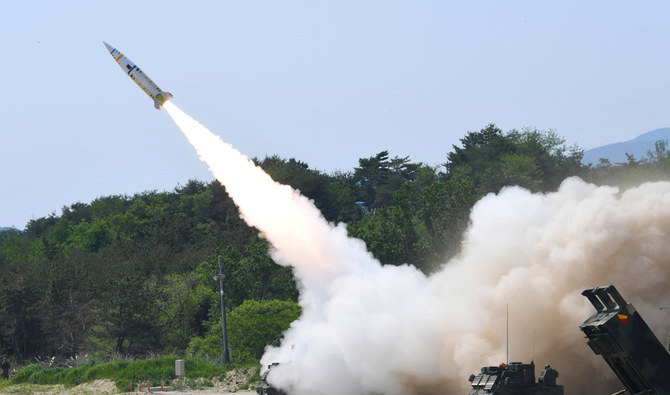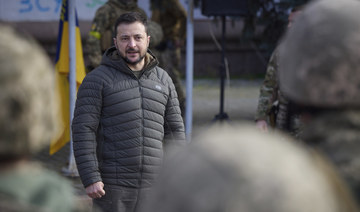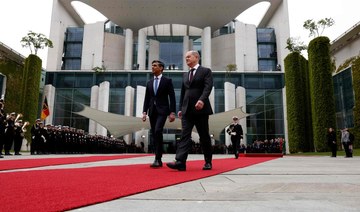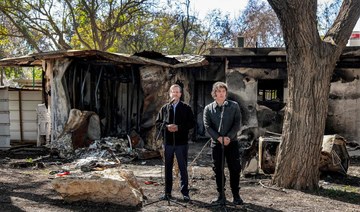WASHINGTON: Ukraine for the first time has begun using long-range ballistic missiles provided secretly by the United States, bombing a Russian military airfield in Crimea last week and Russian forces in another occupied area overnight, American officials said Wednesday.
Long sought by Ukrainian leaders, the new missiles give Ukraine nearly double the striking distance — up to 300 kilometers (190 miles) — that it had with the mid-range version of the weapon that it received from the US last October. One of the officials said the US is providing more of these missiles in a new military aid package signed by President Joe Biden on Wednesday.
Biden approved delivery of the long-range Army Tactical Missile System, known as ATACMS, in February, and then in March the US included a “significant” number of them in a $300 million aid package announced, one official said.
The two US officials, who spoke on condition of anonymity to discuss the delivery before it became public, would not provide the exact number of missiles given last month or in the latest aid package, which totals about $1 billion.
Ukraine has been forced to ration its weapons and is facing increasing Russian attacks. Ukraine had been begging for the long-range system because the missiles provide a critical ability to strike Russian targets that are farther away, allowing Ukrainian forces to stay safely out of range.
Information about the delivery was kept so quiet that lawmakers and others in recent days have been demanding that the US send the weapons — not knowing they were already in Ukraine.
For months, the US resisted sending Ukraine the long-range missiles out of concern that Kyiv could use them to hit deep into Russian territory, enraging Moscow and escalating the conflict. That was a key reason the administration sent the mid-range version, with a range of about 160 kilometers (roughly 100 miles), in October instead.
Adm. Christopher Grady, vice chairman of the Joint Chiefs of Staff, said Wednesday that the White House and military planners looked carefully at the risks of providing long-range fires to Ukraine and determined that the time was right to provide them now.
He told The Associated Press in an interview that long-range weapons will help Ukraine take out Russian logistics nodes and troop concentrations that are not on the front lines. Grady declined to identify what specific weapons were being provided but said they will be “very disruptive if used properly, and I’m confident they will be.”
Like many of the other sophisticated weapons systems provided to Ukraine, the administration weighed whether their use would risk further escalating the conflict. The administration is continuing to make clear that the weapons cannot be used to hit targets in Russia — only those inside Ukrainian territory, according to one of the US officials.
“I think the time is right, and the boss (Biden) made the decision the time is right to provide these based on where the fight is right now,” Grady said Wednesday. “I think it was a very well considered decision, and we really wrung it out — but again, any time you introduce a new system, any change — into a battlefield, you have to think through the escalatory nature of it.”
Ukrainian officials haven’t publicly acknowledged the receipt or use of long-range ATACMS. But in thanking Congress for passing the new aid bill Tuesday, Ukrainian President Volodymyr Zelensky noted on the social platform X that “Ukraine’s long-range capabilities, artillery and air defense are extremely important tools for the quick restoration of a just peace.”
One of the US officials said the Biden administration warned Russia last year that if Moscow acquired and used long-range ballistic missiles in Ukraine, Washington would provide the same capability to Kyiv.
Russia got some of those weapons from North Korea and has used them on the battlefield in Ukraine, said the official, prompting the Biden administration to greenlight the new long-range missiles.
The US had refused to confirm that the long-range missiles were given to Ukraine until they were actually used on the battlefield and Kyiv leaders approved the public release. One official said the weapons were used early last week to strike the airfield in Dzhankoi, a city in Crimea, a peninsula that Russia seized from Ukraine in 2014. They were used again overnight east of the occupied city of Berdyansk.
Videos on social media last week showed the explosions at the military airfield, but officials at the time would not confirm it was the ATACMS.
Ukraine’s first use of the weapon came as political gridlock in Congress had delayed approval of a $95 billion foreign aid package for months, including funding for Ukraine, Israel and other allies. Facing acute shortages of artillery and air defense systems, Ukraine has been rationing its munitions as US funding was delayed.
With the war now in its third year, Russia used the delay in US weapons deliveries and its own edge in firepower and personnel to step up attacks across eastern Ukraine. It has increasingly used satellite-guided gliding bombs — dropped from planes from a safe distance — to pummel Ukrainian forces beset by a shortage of troops and ammunition.
The mid-range missiles provided last year, and some of the long-range ones sent more recently, carry cluster munitions that open in the air when fired, releasing hundreds of bomblets rather than a single warhead. Others sent recently have a single warhead.
One critical factor in the March decision to send the weapons was the US Army’s ability to begin replacing the older ATACMS. The Army is now buying the Precision Strike Missile, so is more comfortable taking ATACMS off the shelves to provide to Ukraine, the official said.
Ukraine uses long-range missiles secretly provided by US to hit Russian-held areas, officials say
https://arab.news/4hzng
Ukraine uses long-range missiles secretly provided by US to hit Russian-held areas, officials say

- The new missiles give Ukraine nearly double the striking distance up to 300 kilometers
- The two US officials would not provide the exact number of missiles given last month or in the latest aid package, which totals about $1 billion
Austria to resume aid to UN agency for Palestinians
Israel alleged in January that some United Nations Relief and Works Agency (UNRWA) employees may have participated in the Hamas attacks on October 7 that triggered the war in the Gaza Strip.
In the weeks that followed, numerous donor states, including Austria, suspended or paused some $450 million in funding.
Many, including Germany, Sweden, Canada and Japan, had since resumed funding, while others have continued to hold out.
“After analizing the action plan in detail” submitted by UNRWA “to improve the functioning of the organization,” Austria has decided to “release the funds,” its foreign ministry said in a statement.
A total of 3.4 million euros ($3.7 million) in funds have been budgeted for 2024, and the first payment is expected to be made in the summer, the statement said.
“Some of the Austrian funds will be used in the future to improve internal control mechanisms at UNRWA,” it added.
Austria said it will “closely monitor” the implementation of the action plan with other international partners, noting that “a lot of trust had been squandered.”
The Alpine country said it has substantially increased support for the suffering Palestinian population in Gaza and the region since 7 October, making 32 million euros ($34.8 million) in humanitarian aid available to other international aid organizations.
The Hamas attack on October 7 resulted in the death of more than 1,170 people in Israel, most of them civilians, according to an AFP tally based on official Israeli figures.
Israel’s campaign in Gaza has since killed at least 35,303 people, also mostly civilians, according to data provided by the health ministry in the Hamas-run territory.
Flash floods kill at least 50 people in western Afghanistan

- Death toll was based on preliminary reports and might rise
- Hard-hit province of Ghor has suffered significant financial losses
ISLAMABAD: Flash floods from heavy seasonal rains in western Afghanistan have killed at least 50 people and dozens remain missing, a Taliban official said on Saturday, adding the death toll was based on preliminary reports and might rise.
Afghanistan has been witnessing unusually heavy seasonal rains.
The hard-hit province of Ghor has suffered significant financial losses, said Abdul Wahid Hamas, spokesman for the provincial governor, after thousands of homes and properties were damaged and hundreds of hectares of agricultural land destroyed following Friday’s floods, including the capital city Feroz Koh.
The Taliban’s government chief spokesman posted on social platform X, mourning “the loss of our fellow Afghans,” and urged ” responsible authorities ... to provide all necessary support to alleviate the suffering.” He also called on “our benevolent donors” to help and humanitarian organizations to provide the affected communities with aid.
Last week, the UN food agency said the exceptionally heavy rains in Afghanistan have killed more than 300 people and destroyed thousands of houses, mostly in the northern province of Baghlan, which bore the brunt of floods on May 10th.
Survivors have been left with no home, no land, and no source of livelihood, the World Food Organization said. Most of Baghlan is “inaccessible by trucks,” said WFP, adding that it is resorting to every alternative it can think of to deliver food to the survivors.
The latest disaster came on the heels of devastating floods that killed at least 70 people in April. The waters also destroyed about 2,000 homes, three mosques and four schools in western Farah and Herat, and southern Zabul and Kandahar provinces.
Nearly 10,000 evacuated in Ukraine’s Kharkiv region: governor

- Ukrainian President Volodymyr Zelensky plays down Russia’s gains in the offensive
- Moscow has been attacking several settlements including Vovchansk, just five kilometers from the border
KYIV: Nearly 10,000 people have been forced to leave their homes in Ukraine’s northeastern Kharkiv region since a ground attack launched by Russian forces on May 10, the regional governor said.
The assault may only be the first wave of a wider offensive, Ukrainian President Volodymyr Zelensky said.
Over a week after its launch, “a total of 9,907 people have been evacuated,” governor Oleg Synegubov said.
They were fleeing Russian soldiers who managed to advance between five to 10 kilometers (three to six miles) along the northeastern border before being stopped by Ukrainian forces.
Synegubov said Ukraine’s armed forces had repelled two attempts to break through defenses overnight.
The situation was “under control” with “defenders in certain areas conducting assault... and combing operations.”
Moscow has been attacking several settlements including Vovchansk, just five kilometers from the border.
“In the area of the city of Vovchansk, Ukrainian troops are reinforcing their defense,” Synegubov said.
A day earlier, he said Russian forces have started to destroy Vovchansk and all but 200 of its residents have fled due to fighting.
Russian forces have taken 278 square kilometers (107 square miles) between May 9 and 15, their biggest gains since the end of 2022, AFP calculated using data from the Institute for the Study of War (ISW).
Russia’s offensive “could consist in several waves. There was the first wave” in the Kharkiv region, Zelensky said journalists.
Zelensky played down Russia’s gains in the offensive but added: “We have to be sober and understand that they are going deeper into our territory. Not vice versa. And that’s still their advantage.”
Speaking about the offensive during a visit to China on Friday, Russian President Vladimir Putin said it was a response to Ukraine shelling border regions.
Nepal latest to ban Indian spice brands over safety concerns

- Hong Kong, Singapore last month banned products from Everest and MDH after tests detected presence of ethylene oxide
- Besides its use as a pesticide, ethylene oxide is used to sterilize medical equipment and as a sterilising agent in spices
KATMANDU: Nepal has become the latest jurisdiction to ban the import and sale of two popular Indian spice brands after reports that some of their products contained a cancer-causing pesticide, officials said Friday.
Hong Kong and Singapore last month banned products from Everest and MDH — two brands popular in India and exported worldwide — after tests detected the presence of ethylene oxide, according to media reports.
Besides its use as a pesticide, ethylene oxide is used to sterilize medical equipment and as a sterilising agent in spices to prevent illnesses caused by salmonella and E. Coli bacteria.
Regular exposure to the colorless and odourless compound increases the “risk of cancers of the white blood cells,” according to the US Environmental Protection Agency.
Matina Joshi Vaidya, chief of Nepal’s Department of Food Technology and Quality Control, told AFP that the Himalayan country had also decided to halt the sale of the spice blends.
“It is an issue of public health,” she said. “We have its banned import and sale from Thursday.”
Nepal has banned four products — three variants produced by MDH and one by Everest.
“We do not have the lab resources to run the tests in the country. The ban will be lifted when Indian authorities declare it safe,” Vaidya said.
Everest and MDH are India’s top two spice brands with a market share of 16 and 10 percent respectively in 2022, according to consumer research monitor Statista.
Both companies have put out statements denying their products pose a health hazard to consumers after the Singapore and Hong Kong import bans.
“We clarify and state unequivocally that these claims are untrue and lack any substantiating evidence,” MDH said last month on social media platform X.
India’s food regulation agency has asked for state authorities to carry out random testing of spice products, broadcaster NDTV reported.
Argentine president begins unusual visit to Spain, snubbing officials and courting the far-right

- The brash President Javier Milei has no plans to meet Spain's PM — nor any other government official
- He will instead attend a far-right summit Sunday hosted by Sánchez’s fiercest political opponent, the Vox party
BUENOS AIRES, Argentina: Even before kicking off a three-day visit to Madrid on Friday, Argentina’s libertarian President Javier Milei stirred controversy, accusing the socialist government of bringing “poverty and death” to Spain and weighing in on corruption allegations against the prime minister’s wife.
In such circumstances, a typical visiting head of state may strive to mend fences with diplomacy.
Not Milei. The brash economist has no plans to meet Spanish Prime Minister Pedro Sánchez during his three days in the Spanish capital — nor the Spanish king, nor any other government official. Instead, he’ll attend a far-right summit Sunday hosted by Sánchez’s fiercest political opponent, the Vox party.
The unorthodox visit was business as usual for Milei, a darling of the global far right who has bonded with tech billionaire Elon Musk and praised former US President Donald Trump. Earlier this year on a trip to the United States, Milei steered clear of the White House and took the stage at the Conservative Political Action Conference, or CPAC, where he railed against abortion and socialism and shared a bear hug with Trump.
Milei presented his 2022 book, “The Way of the Libertarian,” in Madrid Friday at a literary event organized by La Razón, a conservative Spanish newspaper.
The book — withdrawn from circulation in Spain earlier this month because the back-flap biography erroneously said Milei had earned a doctorate — traces his meteoric rise in politics from eccentric TV personality to national lawmaker and outlines his radical free-market economic ideas.
To thunderous applause, Milei condemned socialism as “an intellectual fraud and a horror in human terms.”
“The good thing is that the spotlight is shining on us everywhere and we are making the reds (leftists) uncomfortable all over the world,” Milei said.
He took the opportunity to promote the results of his harsh austerity campaign in Argentina, celebrating a decline in monthly inflation in April though making no mention of the Buenos Aires subway fares that more than tripled overnight.
Repeating a campaign pledge to eliminate Argentina’s central bank — without giving further details — Milei promised to make Argentina “the country with the most economic freedom in the world.”
At the event Milei gave a huge hug to his ideological ally Santiago Abascal, the leader of the hard-right Vox party and the only politician with whom Milei has actual plans to meet in Madrid.
The Vox summit Sunday seeks to bring together far-right figures from across Europe in a bid to rally the party’s base ahead of European parliamentary elections in June. Milei described his attendance a “moral imperative.” He also has plans to meet Spanish business executives Saturday.
Tensions between Milei and Sánchez have simmered since the moment the Spanish prime minister declined to congratulate the libertarian economist on his shock election victory last November.
But hostility exploded earlier this month when one of Sánchez’s ministers suggested Milei had taken narcotics. The Argentine presidency responded with an unusually harsh official statement accusing Sánchez’s government of “endangering the middle class with its socialist policies that bring nothing but poverty and death.”
The lengthy government statement also accused Sánchez of having “more important problems to deal with, such as the corruption accusations against his wife.”
The allegations of influence peddling and corruption brought by a right-wing group against Sánchez’s wife, Begoña Gómez, had prompted Sánchez, one of Europe’s longest serving Socialist leaders, to consider stepping down.


















